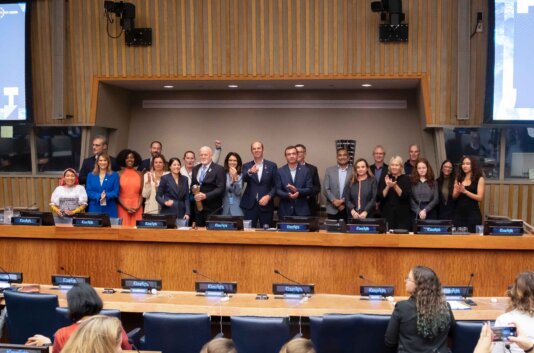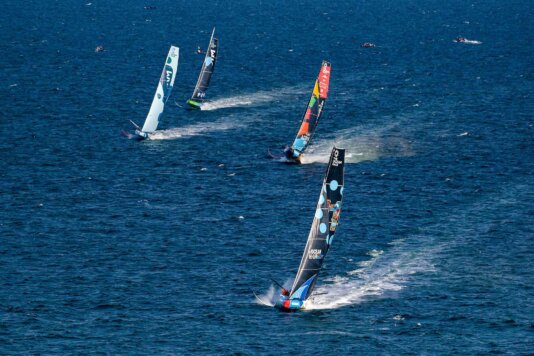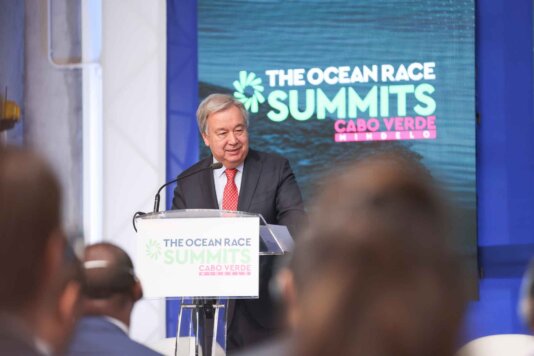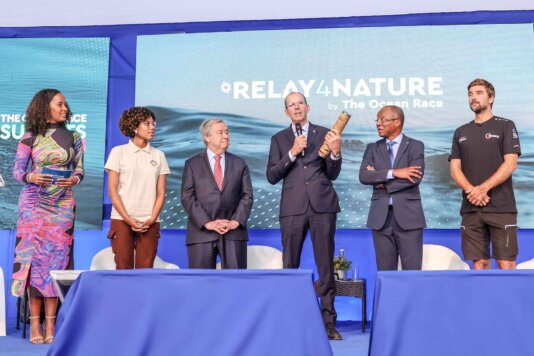- About
- Topics
- Story
- In-Depth
- Picks
- Opinion
- News
- Donate
- Signup for our newsletterOur Editors' Best Picks.Send
Read, Debate: Engage.
| July 02, 2024 | |
|---|---|
| topic: | Ocean Pollution |
| tags: | #ocean, #pollution, #High Seas Treaty |
| located: | New Zealand, Ecuador, USA |
| by: | Francesca Pamela Norrington |
Every time you breathe, half of the oxygen you inhale comes from the ocean. The ocean regulates climate, hosts 186,032 'accepted' species (many are yet to be discovered), and provides food and livelihoods globally. But humanity's insatiable appetite for resources has led to increased overfishing, worsened by bycatch, deep-sea mining and pollution (plastic, oil, noise), causing the seas to deteriorate rapidly.
Experts now stress that practical and systematic solutions are essential to sustain the seas for future generations.
An analysis by the Marine Conservation Institute suggests that only 2.8 per cent of the ocean is protected. This includes about 10 per cent of territorial seas, 5 per cent of Exclusive Economic Zones (EEZ) and a mere 0.14 per cent of the High Seas.
According to Guillermo Ortuño Crespo, co-lead of the IUCN WCPA High Seas Specialist Group, the recent High Seas Treaty (2023), while a step in the right direction, is "lacking teeth."
When negotiations began, a significant aspect of the treaty was that it should not undermine existing bodies.
"You can work with, but not undermine, the fisheries organisations, the shipping and the mining," explained Crespo.
"When I arrived at the UN in 2015, my first question was: how are we supposed to govern marine genetic resources, create protected areas or run environmental impact assessments without affecting fishing, mining or shipping, which are the primary drivers of biodiversity loss in the high seas? Fast forward almost a decade, and we still have the same question."
Marine protected areas do not necessarily consider migratory species. Crespo noted that the Galapagos, though a protected static feature, house highly migratory animals.
"30 per cent of the ocean is nothing to migratory animals," he said. "If a migratory animal is enjoying the protection of an area, whether within or beyond national jurisdiction, it is great, so long as it stays in that box."
The 30 by 30 initiative, which is a worldwide initiative for governments to designate 30 per cent of Earth's land and ocean area as protected areas by 2030, though catchy, is insufficient, according to Guillermo.
"High-seas fishing nations can report however much they would like, entirely unregulated," he explained.
Only coastal states within their EEZ have the authority to determine whether fishing activity is legal or illegal. However, fishing can be unregulated and conducted outside the legal framework. This results in 34.2 per cent of fisheries being overfished.
"It's the fox guarding the hen house," said Crespo.
The theory of Nature Rights has been proposed as a way to address and remedy humanity’s destructive behavior towards the planet. For Western industrial nations, the concept originates from law professor Christopher Stone's 1970 article, 'Should Trees Have Standing - Toward Legal Rights for Natural Objects,' which laid out this concept of nature possessing legal rights different from human rights.
"The theory that nature could become a holder of legal rights builds on the theory applied to people who were being denied rights," Mari Margil, executive director of the Center for Democratic and Environmental Rights (CDER), told FairPlanet.
"For tribal nations in the United States and Indigenous peoples around the world, nature is considered to be a relative, a creator, a provider, its own autonomous universe since long before colonisation and settlement," Margil told FairPlanet.
Ecuador is currently the only country that has implemented the rights of nature in its constitution. Chapter Seven, which Margil’s team advised, grants Pachamama certain legal rights, such as the right to be restored, exist and evolve. This doctrine allows individuals to speak and act on nature’s behalf and thus better challenge decisions harmful to the environment.
Michelle Bender, legal counsel and head of ocean rights at Ocean Vision Legal, told FairPlanet: "These laws ask individuals to change values and ethics. Their implementation requires education so that individuals can understand how this will work in practice, how they can defend nature and what their rights are."
In 2017, the Whanganui River in Aotearoa, New Zealand, was given the rights of a legal person under the Te Awa Tupua (Whanganui River Claims Settlement) Act of 2017.
On 28 March, 2024, Indigenous leaders of Aotearoa (New Zealand), the Cook Islands, Tahiti, Tonga, Hawaii and Rapanui (Easter Island) ratified a historic treaty - He Whakaputanga Moana (Declaration for the Ocean), which recognises whales as legal persons with inherent rights, including the right to freedom of movement, a healthy environment and the ability to thrive.
This was followed by the recognition of sea turtles as subjects of rights in Panama and the recognition of marine turtles and sharks as natural entities in the Loyalty Islands Province of New Caledonia, among several others.
Margil noted that when drafting new legislation recognising the rights of nature, it is essential to include provisions clarifying that while nature has rights under the law, it does not carry duties or obligations. This ensures that the law can't be undermined by saying that nature is failing to fulfil its duties as a legal person.
"Legal personality is a human construct," explained Bender.
The American philosopher Thomas Berry (1914-2009) contended that humans have human rights, fish have fish rights and trees have tree rights, and that everything is unique in the ecosystem depending on their characteristics, what they need and deserve is going to be different.
Michelle Bender is the leading expert in the Rights of Nature, and introduced and created the framework of Ocean Rights in 2017 as an adaptation of the Rights of Nature.
Bender participated in the draft principles for a Universal Declaration of Ocean Rights, which was shared alongside the government of Cabo Verde with the United Nations General Assembly in September 2023. The principle of this declaration explains Bender is "Understanding what the ocean is, what our relationship with the ocean is and principles underpinning ocean rights."
This document gathers insights from 150 scientists, legal experts, indigenous leaders and government officials on how to shape and implement the principles of ocean rights.
Bender explained, "Ocean Rights is the recognition of the ocean as a living entity with inherent rights and intrinsic value. This framework involves developing and implementing legal structures that recognise these rights and allow for legal action on its behalf."
The fundamental principle of this movement is that since the ocean is vital to our survival, it should be attributed rights corresponding to the ecological services it provides to humanity.
A key organisation raising awareness and providing education about this movement is The Ocean Race, which organised the campaign One Blue Voice as a petition for Ocean Rights, gathering signatures from 32,000 people from 178 countries around the world.
The race organises sporting events, including a yacht race around the world every three to four years. Due to their close link to the seas, the race has been outspoken in marine conservation.
Lucy Hunt, ocean impact director at The Ocean Race, explained to FairPlanet, "The ocean means everything to us. Sailors and sportspeople, in general, are highly linked to their natural environment and are important pillars of these conversations," Hunt explained.
"We started bringing ocean rights and personhood of the ocean to our summit events, which were content with government leaders, scientists, sports people, and students."
According to Hunt, the purpose was to enhance education in young people and their general audience to build a better relationship with their sea.
The draft Declaration of Ocean Rights is emerging as a tool for empowering individuals and communities to assert their right to a healthy ocean. "All of nature should have the right to simply exist, the right to be restored if its rights are harmed or violated and the right to be resilient," concluded Mari Margil.
Image by The Ocean Race.
By copying the embed code below, you agree to adhere to our republishing guidelines.




